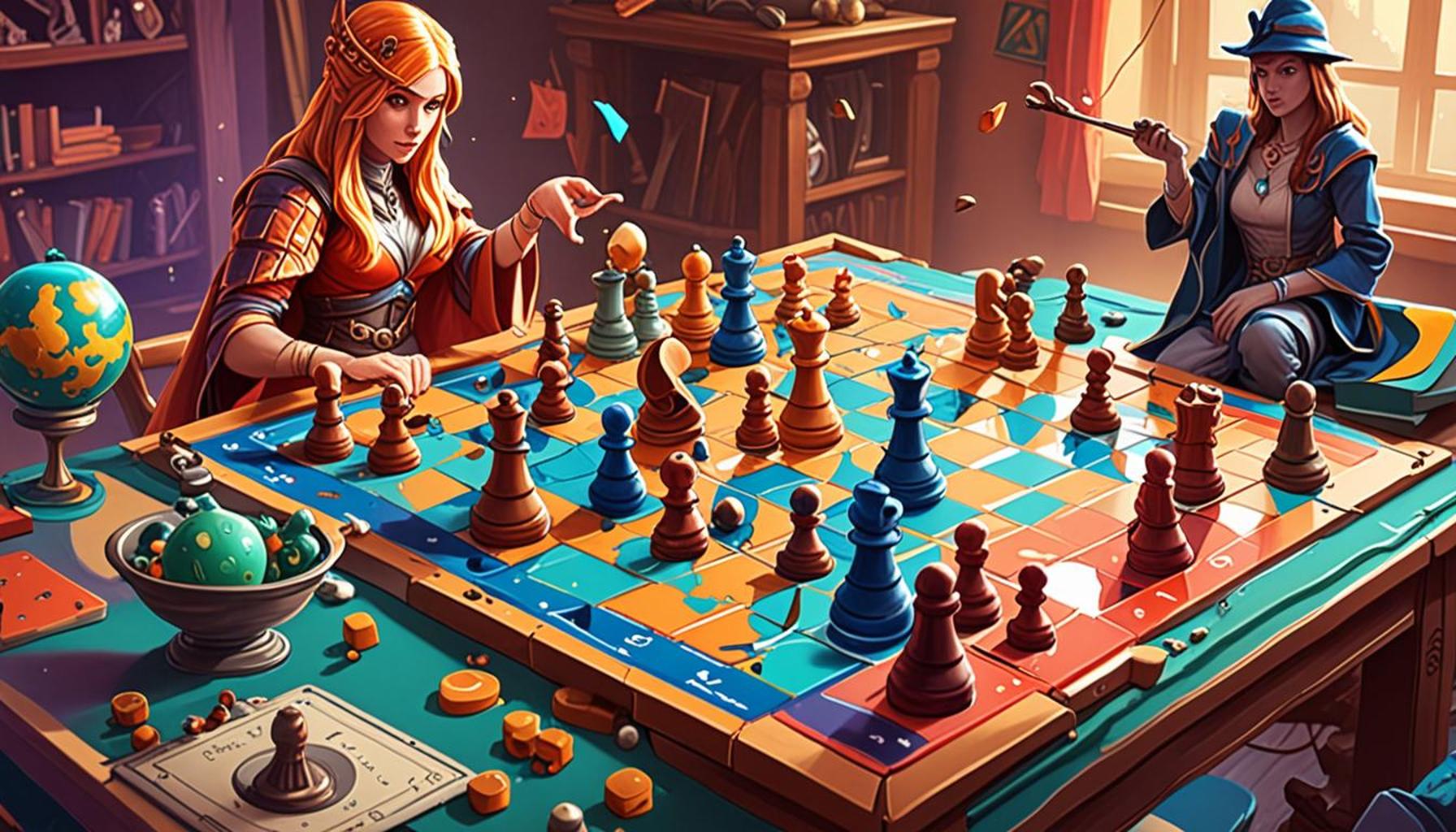The Art of Prediction in Strategy Games: Deciphering the Opponent’s Moves

Understanding the Essence of Prediction
In the realm of strategy games, predicting your opponent’s moves can be the pivotal factor between victory and defeat. Players engage in a mental duel that tests their ability to read intentions, anticipate actions, and devise counter-strategies. This intricate dance of minds isn’t merely about guesswork; it involves a calculated approach to anticipate not just the next move, but the overall strategy your opponent might employ throughout the course of the game.
The Importance of Anticipation
Anticipating an opponent’s strategy involves multiple layers, including:
- Analysis of Patterns: Observing past moves to identify trends is crucial. For instance, if a player consistently opens with a certain strategy, predicting that they will do so again in future games can provide a significant edge. This type of analysis may include studying common responses to specific actions or noticing how various opponents react in similar situations.
- Psychological Insights: Understanding the psychological profiles of different players adds depth to prediction. For example, some players thrive on aggression, while others might retreat into defensive strategies. By evaluating their personality traits, one can make educated guesses about potential moves based on their typical behavior under pressure.
- Game Mechanics: Leveraging specific game rules that can influence decisions plays a vital role. Different strategy games have unique mechanics or characteristics that dictate how players will respond. Familiarizing oneself with these rules can give insights into the best strategies to employ and predict.
Why Prediction Matters
The ability to successfully predict moves in strategy games is essential for several reasons:
- Strategic Advantage: Gaining the upper hand by being one step ahead enhances the possibility of victory. In games like chess, anticipating an opponent’s pattern can lead you to thwart their plans effectively, allowing you to maintain the initiative.
- Resource Management: Optimizing resources based on expected outcomes allows players to allocate their resources more efficiently. For instance, in games like Settlers of Catan, predicting your opponents’ trades enables you to make better decisions about what resources to hoard or trade.
- Adaptability: Adjusting strategies dynamically as the game evolves is vital. Strategies in games like StarCraft or Magic: The Gathering can depend on constant shifts in player maneuvers; thus, staying vigilant and flexible can make all the difference in outcome.
Mastering the art of prediction not only enhances gameplay but also cultivates essential skills transferable to real-life scenarios, such as decision-making and critical thinking. These skills can aid in personal and professional settings, where predicting outcomes or anticipating reactions can lead to better planning and execution. As you delve deeper into this fascinating topic, you’ll uncover the secrets that separate novice players from seasoned strategists, revealing a world in which foresight and insight reign supreme.
DIVE DEEPER: Click here to discover more

Decoding the Signals of Strategy
The world of strategy games is akin to an intricate mosaic of strategies, tactics, and mind games where each player must decipher the signals emitted by their opponents. Understanding these signals not only enhances one’s gameplay but also lays the groundwork for a strategic forecast of impending moves. This process transforms into an essential skill, one that can dramatically alter the course of the game.
The Role of Game Theory in Prediction
At the core of predicting an opponent’s moves lies the fascinating discipline of game theory. This mathematical framework analyzes competitive situations where the outcomes depend on the choices of multiple players. In the context of strategy games, players must evaluate their own strategies while simulating what their opponents might choose in response. Here are some core principles of game theory that can aid players in their predictive efforts:
- Dominant Strategies: A dominant strategy is one that yields a better outcome for a player regardless of what the opponent does. Recognizing and exploiting these strategies can lead a player to make predictions with a higher probability of success.
- Nash Equilibrium: This concept refers to a situation in which no player can benefit from changing their strategy while the other players keep theirs unchanged. Understanding where these equilibria lie in a game can help players anticipate stalemates or aggressive shifts that might lead to breakthroughs.
- Mixed Strategies: When players randomize their strategies to keep opponents guessing, predicting moves can become challenging. Recognizing when opponents are employing mixed strategies can trigger a need for heightened scrutiny and mental recalibration.
The Influence of Historical Context
Beyond theoretical frameworks, the historical context of the game can provide valuable insights into player behavior. Many strategy games, particularly classic ones like chess and Go, possess rich historical narratives that shape contemporary play styles. Drawing on historical matchups can offer clues about common traps, favored openings, and effective counterplays. For example, in chess, the well-documented strategies from Grandmasters can inform modern players about possible continuations of play based on highly positioned patterns established in previous matches.
Additionally, players should pay attention to the ever-evolving metagame—the landscape of popular strategies that emerges from ongoing tournaments and competitions. Knowledge of trending strategies allows players to anticipate and adapt to opponents who may be influenced by the current meta. Considering how popular players adjust their tactics in live competitions can hone one’s ability to predict moves in real-time scenarios.
Through the synthesis of game theory, historical context, and evolving social dynamics, a player enhances their ability to predict their opponent’s maneuvers accurately. By diving deeper into this realm, players not only empower themselves in games but also gain insights into the psychological aspects of competition. This elevated understanding can be the key to unlocking a series of strategic advantages, turning mere predictions into a winning formula in the challenging universe of strategy games.
The Intricate Dance of Prediction
In the world of strategy games, the player’s ability to predict opponent moves is tantamount to securing victory. This form of mental warfare requires not only acute observation but also a deep understanding of game mechanics and human psychology. The player must anticipate potential strategies and counter-strategies, creating a dynamic interplay that can shift with each turn.
| Advantage | Description |
|---|---|
| Enhanced Decision-Making | Ability to foresee opponent strategies allows for quick, informed responses to counter them effectively. |
| Increased Competitive Edge | Effective prediction enhances overall gameplay, establishing dominance by exploiting opponents’ weaknesses before they even present themselves. |
Understanding the nuances of your opponent’s psychological cues can dramatically alter the game’s flow. Each hesitation, aggressive move, or unexpected retreat can provide insight into their strategy. Notably, the element of surprise often plays a significant role; an unexpected counter can leave opponents disoriented, allowing players to seize the moment. In-depth research into various strategies and employing predictive models can lead to a better grasp of the meta-game—the overarching strategies that dictate player behavior within the context of the game. Ultimately, mastering the art of predicting moves not only prepares players for battles ahead but enriches their overall gaming experience, making every victory that much sweeter.
DISCOVER MORE: Click here to learn about the impact of collaborative puzzle solving
Psychological Warfare: Understanding Player Mindsets
In strategy games, the battlefield extends beyond mere pieces on a board or characters on a screen; it encompasses the very psychology of the players involved. Mastering the art of prediction requires a nuanced understanding of both one’s own mindset and that of the opponent. Factors such as emotional state, confidence levels, and even personal tendencies can dramatically influence decision-making in high-stakes encounters.
Reading the Opponent’s Behavior
The ability to read an opponent’s behavior can serve as a significant advantage. Players often display subtle cues reflecting their confidence or hesitation. For instance, an opponent who hastily makes a choice might reveal insecurity regarding their strategy, indicating a potential opportunity for exploitation. Conversely, a player who takes their time before executing a move might be engaged in complex calculations, possibly signaling their strength in a given position.
Certain gameplay elements—such as the frequency of aggressive moves or the tendency to retreat when under pressure—can also offer insight into an opponent’s psychological makeup. Players who adopt erratic behavior may thrive on keeping others off balance, which in turn compels their opponents to adopt a more cautious and reactive stance. Understanding these psychological signals allows players to strategize not just in terms of the game mechanics but also in ways to manipulate the psychological atmosphere of the game.
The Impact of Player Experience
The experience level of opponents can significantly shape predictions as well. Veteran players typically have a refined intuition based on numerous matches and experiential learning. They may rely on established patterns or well-engrained strategies, making them more predictable. In contrast, newer players often experiment with unconventional tactics, resulting in an unpredictable playing style. This unpredictability serves as both a challenge and an opportunity for more experienced players, who must remain agile in their predictive efforts.
Importantly, certain individuals may also suffer from common psychological patterns associated with their experience level. The so-called “beginner’s luck” often applies when inexperienced players employ risky strategies that seasoned gamers might discard. On the other hand, experienced players may fall victim to overthinking, leading to missed opportunities or undue hesitancy. Recognizing these traits can help predict their next moves and adjust one’s own strategy accordingly.
Utilizing Simulation Tools
To enhance predictive capabilities further, players can turn to simulation tools that analyze various possible outcomes based on player actions. These tools utilize algorithms to forecast potential movements based on historical data and player tendencies. By incorporating these insights, players can create dynamic and adaptable strategies that evolve alongside their opponents’ styles.
Moreover, many modern strategy games come equipped with built-in analytics that assist players in assessing both their own and their opponents’ strategies. By meticulously studying the data generated from previous games, players can build a robust framework of predictions that help inform their future actions, creating a more strategic edge in competitive environments.
In essence, the art of prediction in strategy games transcends mere statistical analysis; it is a combination of psychological insight, behavioral observation, expert knowledge, and data-driven decision-making. By weaving together these elements, players elevate their ability to anticipate opponent moves, providing them with a refined tactical advantage integral to mastering the realm of strategy gaming.
DISCOVER MORE: Click here to find your calm
Conclusion: Mastering Predictive Strategy
In the intricate world of strategy games, mastering the art of prediction stands as a pivotal skill for aspiring players. By understanding psychological aspects, such as reading an opponent’s behavior and emotional cues, players can better anticipate their adversary’s next moves. This psychological warfare not only involves keen observation but also demands an appreciation for the variance in skill levels, where experienced players may follow patterns and newcomers might introduce unexpected twists.
Moreover, leveraging simulation tools and analytics enriches the predictive process by providing a wealth of data-driven insights. As players analyze these patterns, they gain a significant edge, allowing them to refine their strategies continuously in response to evolving opponents. This continuous adaptation becomes essential, especially in today’s fast-paced gaming environment, where agility in thought can lead to victory.
Ultimately, the art of prediction is not merely a tactical advantage; it fuses together intuition, behavioral analysis, and the use of sophisticated tools to cultivate a deeper strategic understanding. For those seeking to elevate their gameplay and decode their opponents’ strategies, embracing these multifaceted approaches will unlock new horizons in their gaming experience. As players delve deeper into this fascinating discipline, they will find that the true challenge lies not just in making moves, but in anticipating them, turning each match into a profound battle of wits and foresight.


